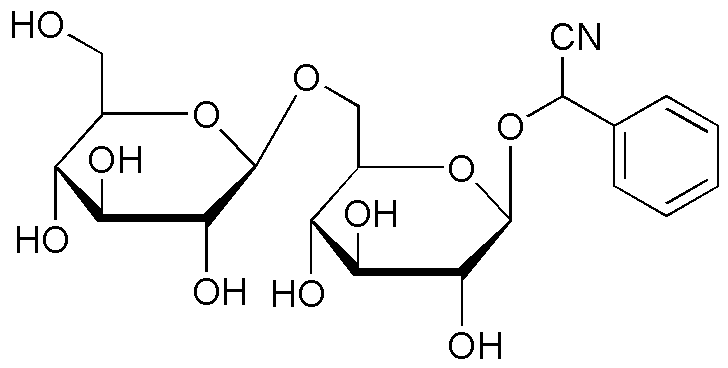Amygdalin is widely utilized in research focused on various applications:
- Natural Health Products: Commonly found in apricot kernels, amygdalin is marketed as a dietary supplement, believed by some to support immune health and overall wellness.
- Cancer Research: Investigated for its potential anti-cancer properties, amygdalin is studied in alternative medicine, although scientific consensus on its efficacy remains debated.
- Pharmaceutical Development: Used as a starting material in the synthesis of other compounds, amygdalin serves as a valuable intermediate in pharmaceutical research.
- Flavoring Agent: Its natural flavor profile makes amygdalin a candidate for use in food products, particularly in creating almond-flavored items.
- Cosmetic Applications: Due to its antioxidant properties, amygdalin is explored in skincare formulations aimed at promoting skin health and reducing signs of aging.
General Information
Properties
Safety and Regulations
Applications
Amygdalin is widely utilized in research focused on various applications:
- Natural Health Products: Commonly found in apricot kernels, amygdalin is marketed as a dietary supplement, believed by some to support immune health and overall wellness.
- Cancer Research: Investigated for its potential anti-cancer properties, amygdalin is studied in alternative medicine, although scientific consensus on its efficacy remains debated.
- Pharmaceutical Development: Used as a starting material in the synthesis of other compounds, amygdalin serves as a valuable intermediate in pharmaceutical research.
- Flavoring Agent: Its natural flavor profile makes amygdalin a candidate for use in food products, particularly in creating almond-flavored items.
- Cosmetic Applications: Due to its antioxidant properties, amygdalin is explored in skincare formulations aimed at promoting skin health and reducing signs of aging.
Documents
Safety Data Sheets (SDS)
The SDS provides comprehensive safety information on handling, storage, and disposal of the product.
Product Specification (PS)
The PS provides a comprehensive breakdown of the product’s properties, including chemical composition, physical state, purity, and storage requirements. It also details acceptable quality ranges and the product's intended applications.
Certificates of Analysis (COA)
Search for Certificates of Analysis (COA) by entering the products Lot Number. Lot and Batch Numbers can be found on a product’s label following the words ‘Lot’ or ‘Batch’.
Número de catálogo
Número de lote/lote
Certificates Of Origin (COO)
This COO confirms the country where the product was manufactured, and also details the materials and components used in it and whether it is derived from natural, synthetic, or other specific sources. This certificate may be required for customs, trade, and regulatory compliance.
Número de catálogo
Número de lote/lote
Safety Data Sheets (SDS)
The SDS provides comprehensive safety information on handling, storage, and disposal of the product.
DownloadProduct Specification (PS)
The PS provides a comprehensive breakdown of the product’s properties, including chemical composition, physical state, purity, and storage requirements. It also details acceptable quality ranges and the product's intended applications.
DownloadCertificates of Analysis (COA)
Search for Certificates of Analysis (COA) by entering the products Lot Number. Lot and Batch Numbers can be found on a product’s label following the words ‘Lot’ or ‘Batch’.
Número de catálogo
Número de lote/lote
Certificates Of Origin (COO)
This COO confirms the country where the product was manufactured, and also details the materials and components used in it and whether it is derived from natural, synthetic, or other specific sources. This certificate may be required for customs, trade, and regulatory compliance.


